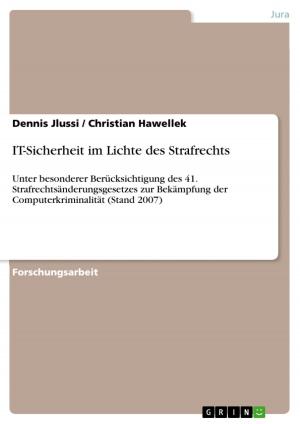Shylock in the EFL-Classroom. Teaching the Aspect of Anti-Semitism in Shakespeare's 'The Merchant of Venice'
Nonfiction, Entertainment, Drama, Anthologies| Author: | Marc Felsbrecher | ISBN: | 9783668179486 |
| Publisher: | GRIN Verlag | Publication: | March 22, 2016 |
| Imprint: | GRIN Verlag | Language: | English |
| Author: | Marc Felsbrecher |
| ISBN: | 9783668179486 |
| Publisher: | GRIN Verlag |
| Publication: | March 22, 2016 |
| Imprint: | GRIN Verlag |
| Language: | English |
Seminar paper from the year 2016 in the subject English Language and Literature Studies - Other, grade: 1,7, , language: English, abstract: The aspect of antisemitism in Shakespeare's play 'The Merchant of Venice' has been relevant throughout the play's history and it has been discussed against different historical backgrounds and with different intentions. But especially since the traumatic historical experience of the Holocaust, the question 'Is Shakespeare's play anti-Semitic and does it evoke anti-Semitic sentiments in the audience?' has been of crucial importance for Shakespeare scholars and theatre directors. But the complexity and controversy of the subject matter might put an even bigger challenge to teachers dealing with the play in EFL-classrooms. However, as compulsory teaching materials for the written Abitur examinations (advanced level) in Lower Saxony in 2014, 2015, 2016 and 2017 the Ministry of Culture lists excerpts from 'The Merchant of Venice' or 'Romeo and Juliet'. So the question that put itself to a teacher in the past four years and will put itself to him in the next two years is not Will I discuss anti-Semitism in my English class at all? But: How will I deal with anti-Semitism in my English class? In order to answer this question, i. e. how to deal with the aspect of anti-Semitism in Shakespeare's 'Merchant of Venice' in the English foreign language classroom, this paper will at first briefly examine the historical background of the play, give a survey on different understandings and interpretations of Shylock and take a look at various stagings of the play (chapter 1). Secondly, it will examine the teaching materials on 'The Merchant of Venice' currently available to teachers with regard to the aspect of anti-Semitism and will compare and assess those materials. Finally, it will put down learning objectives and outline possible methods of teaching (chapter 2).
Seminar paper from the year 2016 in the subject English Language and Literature Studies - Other, grade: 1,7, , language: English, abstract: The aspect of antisemitism in Shakespeare's play 'The Merchant of Venice' has been relevant throughout the play's history and it has been discussed against different historical backgrounds and with different intentions. But especially since the traumatic historical experience of the Holocaust, the question 'Is Shakespeare's play anti-Semitic and does it evoke anti-Semitic sentiments in the audience?' has been of crucial importance for Shakespeare scholars and theatre directors. But the complexity and controversy of the subject matter might put an even bigger challenge to teachers dealing with the play in EFL-classrooms. However, as compulsory teaching materials for the written Abitur examinations (advanced level) in Lower Saxony in 2014, 2015, 2016 and 2017 the Ministry of Culture lists excerpts from 'The Merchant of Venice' or 'Romeo and Juliet'. So the question that put itself to a teacher in the past four years and will put itself to him in the next two years is not Will I discuss anti-Semitism in my English class at all? But: How will I deal with anti-Semitism in my English class? In order to answer this question, i. e. how to deal with the aspect of anti-Semitism in Shakespeare's 'Merchant of Venice' in the English foreign language classroom, this paper will at first briefly examine the historical background of the play, give a survey on different understandings and interpretations of Shylock and take a look at various stagings of the play (chapter 1). Secondly, it will examine the teaching materials on 'The Merchant of Venice' currently available to teachers with regard to the aspect of anti-Semitism and will compare and assess those materials. Finally, it will put down learning objectives and outline possible methods of teaching (chapter 2).















